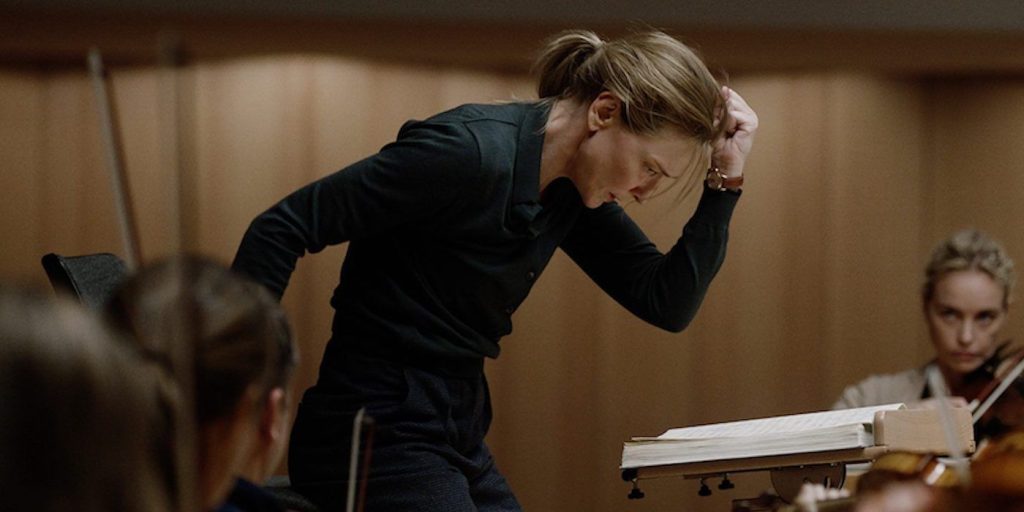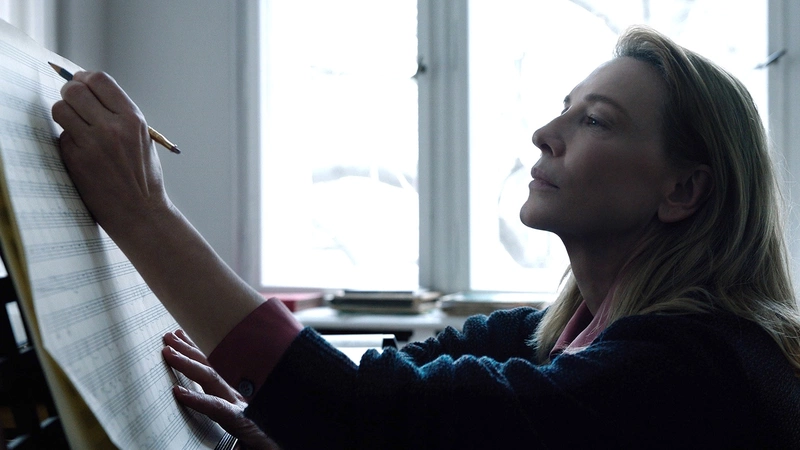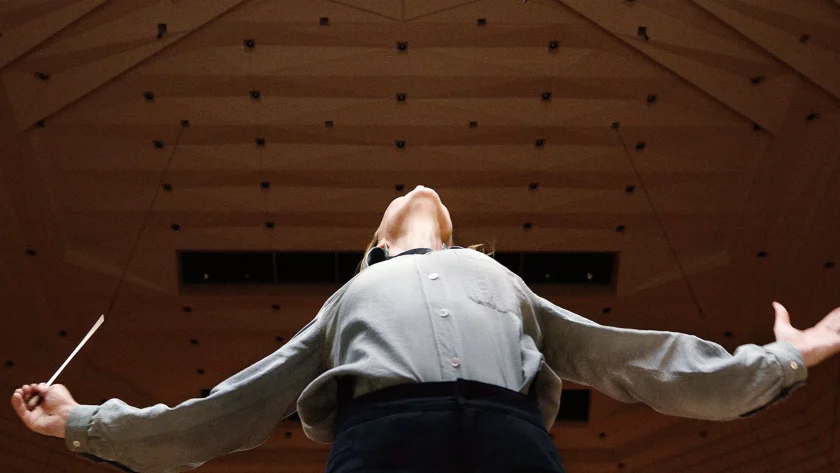The FilmSoc Journal is back for the the 79th edition of Venice film festival, with critic Aryan Tauqeer delivering a look at the hits and misses of the 2022-23 season.
◯ Warning: this review contains spoilers.
Aryan Tauqeer reviews Todd Field’s Tár, which follows the turbulent life of composer-conductor Lydia Tár, played by Cate Blanchett.
In the opening minutes of Todd Field’s triumphant return to filmmaking after a 16-year hiatus, two lenses juxtaposing the dual nature of the contemporary image are presented in succession. Through the lens of a phone’s camera, the pristine white furnishings of a private jet’s interior are observed in strained near-silence, interrupted only by the gentle whirr of an engine reminding us that we are located in a zone of transience. A series of text messages unfold against this backdrop, as an icon signifying an active video recording appears, before the film cuts to a cavernous lecture theatre. The New Yorker essayist Adam Gopnik (playing himself in the film) is in the middle of an interview with a woman who we come to know, through allusions to the implications her name carries, as Lydia Tár. The emptiness of space is leveraged to the effectiveness of its cuts- discomfortingly wide gaps and distances form the structural vocabulary of Tár, which moves between the modes of hyper-paranoid thriller to a languid chronicle of the bourgeois in much the same manner as Cate Blanchett’s conceited conductor moves between modes of polite negotiation and cold-blooded coercion. At the centre of these movements is Blanchett’s remarkably lived-in turn as Lydia Tár, whose cruelty is matched only by her fallibility. Never bordering on the histrionic pantomime its premise opens itself to, the enormity of Tár’s emotional currents lies precisely in the way they are suppressed, fitted in between the seams of its inhospitable interiors until it begins to seep out like a toxic leak.

Part of what renders Field’s portrait of power so entrancing is that it stands out as one of few recent dramas (genre films notwithstanding) that situates itself squarely in the centre of an upper-class zeitgeist without sounding overbearing in its syntax or didactic in its narrative. As with its environments, the ungarnished nature of its dialogue- particularly that between Lydia and her colleagues, much of which is exchanged in places whose wealth-laden walls conceal the implications of what is being discussed. Early on in the film, what is proposed as old friends catching up by debutante conductor Eliot Kaplan (Mark Strong) is all too clearly a waste of time for Lydia, whose self-professed magnanimity in lending advice to conductors less successful than her manifests in the form of aloof condescension. Conversely, the eagerness with which her colleagues seek her approval is excruciating to witness, especially in light of how these concerns are immediately dumped onto the back of her acquiescent assistant, Francesca (Noemie Merlant), with whom her amiable relationship acts as a source of envy for Lydia’s wife, Sharon (Nina Hoss). The intersection of these conflicting power dynamics is a precarious balancing act that seems, against all odds, to remain static despite Lydia’s increasingly distant relationship with her family-particularly her and Sharon’s adopted daughter Petra (Mila Bogojevic). When an attempt is made to bridge this gap, it is made in precisely the same fashion as Lydia’s negotiations with her colleagues- through threats and ultimatums. One of the more animated sequences in the film follows Lydia’s diversion from her usual routine- instead of seamlessly transitioning into the role of domineering maestro as she would otherwise, her role as conductor seems to bleed into her role as a mother, as she pulls aside a classmate bullying her daughter and calmly threatens to “deal with her”, modulating her ultimatum with the backing of her word as an adult against that of a middle schooler.
One might assume that Tár, as with other recent character studies in the Larrain school of arthouse hysteria, follows the all-too-familiar framework of a descent into madness, bookended by a condescending appeal to authority and the overly didactic moral of being hosted by your own petard. Though the film is very much concerned with shapeshifting moralities, the piercing quality of its commentary stems from its very absence of a moral overseer. Its spatialization of moral quandaries is key- ostensibly shared spaces become monopolised by the titular composer’s seemingly all-encompassing grasp over the world of the concerto. The sequences of composition, in addition to their stirring manifestation of Tár’s turbulent emotional whirlwinds, act as a diorama of power relations, where the dominance of certain instruments over others acts as an affirmation of material power relations. As with its monologues, Field’s formal restraint confines Tár’s characters to rigorous organizational structures- be it seniority, wealth or even marriage- and ignites a fuse premised upon misconception and implication. These structures often manifest in the film’s architecture, particularly Lydia’s apartment, an unflinchingly dull brutalist curio, which seems to exist as a projection of her equally icy disposition- that is, until it is slowly but surely disrupted by the intrusion of one space into another. Much of what renders this transgression between spheres so transfixing instead of what could easily be assumed as derivative is how its attention to audial landscapes is not merely restricted to the spectacle of Lydia’s concerts- when a resounding series of thuds seems to keep her up night after night, the composer’s neuroses are set ablaze as she creates erratic connections between the sins of the past and the urgency of the present.

In the face of a film so rigid in its construction and rareified in its milieu, it is tempting to ascribe to Tár the label of a film about “cancel culture”, for lack of a more delicate phrase- after all, it minimizes the extent to which the film must be navigated if it is viewed solely as an instrument of moral rectification rather that ensures accountability, rather than a paradigmatic battleground of conflicting images. To ascribe such a label, however, would be to overlook the intricacies of what Field’s precision and Hildur Guðnadóttir’s dolorous score have crafted- not a singular insight, but a collage of warring positional interests. Lydia’s subtly lecherous leer towards particular musicians under her tutelage is all too evident as a source of defamation, and yet the images that constitute the second half of The Rise and Fall of Lydia Tár are distortions too rooted in truth to deny, and yet too fabricated to accept fully as an indictment. These quandaries are not especially challenging ones in isolation, something evident in how they are rooted in contemporary discourses of separating the art from the artist. Yet, by framing these quandaries with unerring sincerity, its satire is rendered all the more piercing precisely because it is *not* calculatedly comical. By the time its confounding final shot (bringing to mind the metafictional circuitry of Irma Vep) rolls around, the meticulous extrication of Lydia from the fame that protects her via the very same instruments that preserved her is exhausted of all venom- when no room for the luxury of emotional expression exists, what is there to do but laugh? The grand cosmic joke that the film ends on is emblematic of not just its dramatic potency but of its pertinence to the very ontology of fame: how much can a public figure’s image be separated from themselves until even they can’t distinguish between the cocoon of the image and the fleshy, vulnerable Self inside it?
Tár will be released in cinemas on 13 January 2023. Watch the trailer here:




